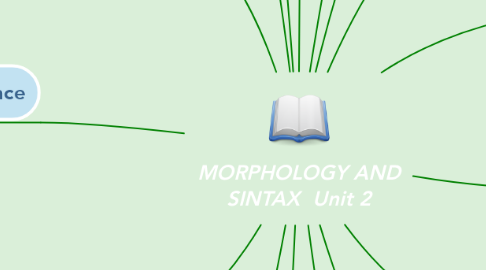
1. Simple Sentence
1.1. A simple sentence is one independent clause that has a subject and a verb and expresses a complete thought. Notice that there are some important requirements for a simple sentence:
1.1.1. Joe went to the store
2. SENTENCE
2.1. is a group of words that expresses a thought the problem comes is defined what is thougth is.
2.1.1. A sentence like I clossed the door because it was cold. expresses two thoughts and yet it is one sentence
2.1.1.1. A sentence is a group of words expresing a topic and some comment
3. sintax
3.1. Syntax is basically about what word comes before and after another word; in other words, it's part of the larger subject of grammar
3.1.1. Sentences are constructed from phrases or group of words that have a closer relationship to other than to the words outside the phrases in the sentence
4. Phrase
4.1. A phrase is a group of words that ecpress a concept and is used as a unit within a sentence
4.1.1. Eigth common types of phrases are: Noun,verb,gerund,gerund,infinitive,apposive,participial,prepositional and absolute
5. compound sentence
5.1. A compound sentence joins two or more independent clauses with a coordinator such as for, and, or but, or a semi-colon. Independent clauses are two phrases that can stand alone as a complete thought. They're not dependent upon one another to express a complete thought, but they tie together similar ideas
5.1.1. here are seven coordinating conjunctions in the English Language, which are used to link the independent clauses: For And Nor But Or Yet So
6. Compound complex sentence
6.1. a compound complex sentence is made up of more than one sentence joined by a conjunction, and at least one of those sentence is complex. In other words, it is a compound sentence with a dependent, or subordinate clause.
6.1.1. I will get to watch television, but first, I have to clean up the dishes after we finish eating.
7. complex sentence
7.1. A complex sentence is made from an independent clause and a dependent clause joined together.
7.1.1. After I came home, I made dinner
8. Noun phrase
8.1. A noun phrase is a word or group of words that can function as the subject the object or the complement in a sentence
8.1.1. E.G. The manager interviewed all the applicants on thuesday
